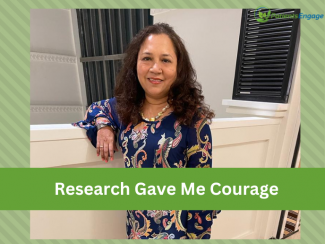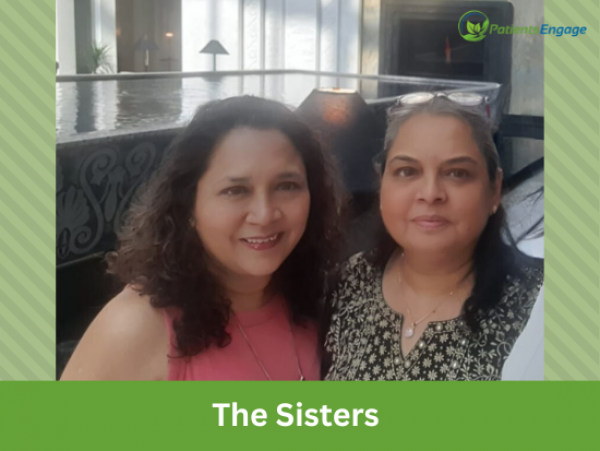
When her sister needed a kidney transplant, Vaishali (53) navigated a complex set of emotions before deciding to donate her kidney to Hemali. On February 6, 2024, they completed one healthy year post-transplant. Vaishali shares her experience of being a kidney donor, the research she did and why she talks about being an organ donor. Read Hemali's perspective of needing a kidney transplant here.
Vaishali, what made you decide to donate your kidney to Hemali?
The thought process to arrive at this decision was not linear. I used to accompany Hemali for dialysis. In my discussions with the nephrologist, he told me that if we lost the case, Hemali’s only chance of survival was a live donation. That is when I started thinking about donating my kidney to her.
The issue was tabled before the family for discussion. We had many conversations between all of us - Hemali and her husband, our youngest sister Rupali and her husband Samip and Hemali’s children as well. There were many factors to be considered. Rupali has young children, Hemali’s eldest daughter is under 30 and has yet to have kids of her own. Hemali had high BP during her pregnancy so it was likely that her eldest daughter may have the same complications in the future putting her at risk. Hemali’s husband was not willing to donate his kidney.
The more I thought about it, it seemed to me that I was the right choice for donation. Most importantly, as a sibling, I was the closest match. Secondly, I was single and my responsibility was to look after my parents. I felt the others were still too young with kids and a full life ahead of them. At 52, I was healthy and best suited to undertake this task. In September 2022, after a few months of research and deliberation, I decided to donate my kidney to Hemali.
Could you elaborate on the journey you went through before you made your decision?
When the idea first came up, my first thought was, “Why me? Why can’t Hemali look at other options like cadaver donation?” But I realised that the other options were not viable. Time was of the essence as Hemali’s health was failing very quickly.
The fear of giving up a part of my body was the biggest thing on my mind. I relied on Rupali and Samip to help me navigate this issue. I decided not to commit anything to Hemali in a burst of emotion. Instead, the three of us started to research live organ donations and study the pros and cons of doing so. I gathered information on multiple fronts. I saw a lot of videos posted by organ donors on YouTube, read a lot of white papers on the subject and met with many kidney and liver donors that I came to know through contacts. This helped me a lot in making my decision. Samip also spoke to doctors in Australia to get a third-party opinion from them. As a family, we spent June to September researching organ donation.
All my research led me to one conclusion. It was scary to donate my kidney but I would survive and have a normal life after donation. There was nothing to worry about. Research reassured me that my decision to donate my kidney to my sister was the right one.
Can you elaborate further?
There were two parts to my decision-making process. One was emotional and the other was rational, backed by research. Both played an important role but the rational research helped the most to cement my decision.
For me, the fear of surgery was greater than the fear of losing one kidney. I have always kept good health and had no surgeries before in my life. I had to get past this fear, to begin with.
The decision to donate a kidney requires a lot of courage. Even though I had decided to donate my kidney and I had research to reassure me, you are not 100% sure till the last minute. The months before the surgery were very tough for me. The fear of the unknown and negative thoughts came up, especially at night and I had to rise above them and convince myself that my decision was the right one. There have been instances where donors have run away just before the surgery as their fear has overtaken their desire to help. I had to be sure of the step I was about to take.
No one can decide for you. Your close confidantes can help you but no one can force you or decide for you. Finally, that is your call alone. You need to find the courage to take the call.

How did you cope with your thoughts? Did you seek counselling?
I made a lot of notes on my research, wrote down what the donors told me and whenever I felt any hesitation, I looked up the notes. I have been part of the Krishna Consciousness movement since my teen years. My spiritual and Vedic background helped me a lot to cope with my fears. I did not undertake any psychological counselling. I did go to a therapist but did not find it helpful. My confidantes were my sister, brother-in-law and a few close friends. The numerous hospital visits for the mandatory tests and organising things at home in preparation for the surgery also kept me busy and occupied.
What also helped was the calls between everybody in the family. We talked a lot - between us three sisters, between the two couples and me. We talked over all the issues and these calls helped to clarify and clear things. Our parents were neutral in the decision since it involved both their children. They did not put any pressure on me.
Donating my kidney was filled with a lot of fear and mental anguish. I went through a lot of mood swings in the months it took to make my decision. I had bouts of crying and many doubts. Slowly, over the months, the emotional outbursts lessened. Once the emotionality settles down, rational thinking takes over. Ultimately, one has to evolve, rise above the fear and find the courage within to take this decision.
How was your recovery post-surgery? How did it change your life?
I took three weeks to recover from the surgery. I stayed in the hospital for a week and then rested at home for two weeks. Post-surgery, I was not allowed to lift heavy weights for two months. I started my regular walks two weeks after the surgery. My body feels just the same, before and after the surgery. I have to be careful of keeping my BP and sugar under control but that holds for anyone post the age of 50. The nephrologist told me that regular screening is important to catch any issues early and treat them. I do a 6-month screening of creatine and other major markers.
What are your feelings post-surgery?
Since the day of the surgery, I have not had a single, even fleeting thought in my head questioning my decision. I am living a full, healthy life. It gives me great happiness to see my sister healthy and happy again.
Read Hemali's experience as a kidney transplant recipient.
Hemali is doing a lot of work in organ donation. Are you also doing the same?
Not very actively. But I do talk to a lot of donors. I have realised that people like to physically meet and not just talk on the phone to a donor. They want to see how you look after the donation. Hemali and I always find time to speak to people who reach out to us. Initially, I did not want to tell anyone I had donated my kidney. Mr. Anil Srivatsa, an organ donor, convinced me to do so. He told me that if you are an organ donor, you must shout it from the rooftops so that others are inspired by you. I had taken the step for my sister but he made me aware of the larger cause since organ donation awareness is so low in our country.
Would you like to leave a message for our readers?
I would say if you are thinking of donating your kidney or any other organ to a family member, then please act on it sooner rather than later as dialysis and other treatments erode other vital organs. I would also like to encourage people to donate their organs after their death because one deceased donor can save up to 8 lives. After your death, your organs will be burnt or buried along with you. Why not donate them and give someone a second chance at life?






